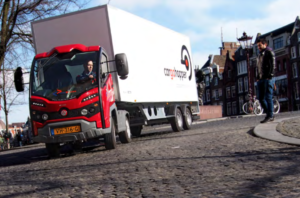The last two years, Amsterdam Smart City and the University of Applied Sciences systematically analysed 12 smart city projects in Amsterdam including city logistics. In close cooperation with Amsterdam Smart City five researchers started a thorough evaluation of projects to draw lessons and make future smart city projects more effective.
The idea was to analyse the non-technological aspects of smart city projects (partnerships, business models, scaling potential) since smart city solutions are not just about developing and applying technology. It demands new networking and management competencies. Solutions are not developed and implemented by one single company, but take shape in networks and with the involvement of citizens/end users. Partnerships are formed, they all work differently and face different challenges. In this study, a number of smart city projects in Amsterdam is analysed in their wider context, including city logistics projects CargoHopper and Mokum Mariteam.

The final report is now out and focuses on questions as:
- How do organisations with different agendas, collaborate on smart city projects?
- What challenges do they face?
- What kind of value is created?
- How are risks and returns shared, and how are users involved?
- What is the upscaling dynamic of smart city solutions, if any?
- How can smart city projects be managed professionally?
The final report can be downloaded here.
